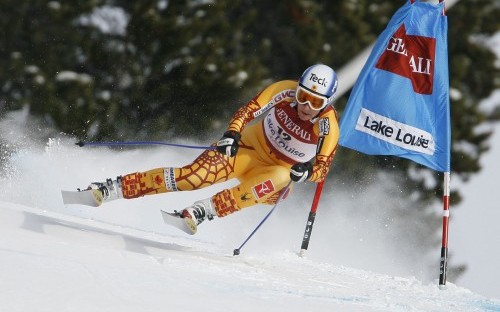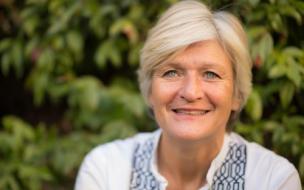We spoke with Emily who is a less than a week away from completing her MBA at Imperial College Business School to see what lessons she would be taking from the world of competitive sports into the business environment.
“Being an athlete is like running your own business”, said Emily, who considers herself to have had a lucky childhood where she skied because she loved it and not because of pressure and expectations from her parents. “It’s about hard work and being passionate about what you do”.
Emily, 32, was born in Fernie, a small town in British Columbia. She learned to ski with friends and family at a young age and joined the ski team there. She performed well at each level and made the national team at the age of 17. She went on to represent Canada at three Olympic games and has earned nine World Cup medals in Alpine skiing.
As an athlete, Emily worked with sponsors such as Visa, represented several sports companies, and also founded her own youth foundation.
Retiring in 2010 and doing an MBA was a way for Emily to make the transition from professional athlete to professional career woman. Emily felt she needed an MBA to give her experiences within sports more credibility.
She was interested in gaining new knowledge and felt that Imperial’s focus on innovation and entrepreneurship would be the perfect springboard for her transition: “It’s not many times you have a chance to re-identify yourself and start from scratch. If you stay in an environment which is connected to your past, you’ll never move on”, she said.
Of course, being a professional skier came with its own challenges. Emily had to choose on several occasions between carrying on as a professional and entering full-time education. At one point, she had to commit to either taking a college skiing scholarship or training for the Olympics.
She has also dealt with her fair share of injury. She had two separate knee injuries ten months apart in 2001, and came close to hanging up her skis in 2006. She needed a break from constantly being under the spotlight so she packed her bags and went to Australia for six weeks.
During her time away she thought about her purpose as a professional sports person. “It’s so easy to lose your identity and to forget why you’re doing it, if it’s for yourself, coaches, or sponsors. I got lost in it and didn’t like why I was doing it or the stress from it.
"I went to Australia, didn’t think about sports for a while and sat down and made a list of the pros and cons of skiing. I had about five pro points, and ten pages of cons but those five pros outweighed the ten pages of cons which were just emotions”.
It was during this hiatus that Emily decided to go for another Olympic games, this time it would be held in her home country, Canada. She also decided to found the Emily Brydon Youth Foundation because she wanted to give her sporting career a bigger meaning and the Foundation would be a motivator for her. Emily’s father passed away when she was 18 and the local community came together to raise money and support her so she, “Wanted to pay it forward”.
The Foundation allows kids to experience something new through sports, arts, and education.The Foundation already has an endowment fund of $200,000 in order to guarantee sustainability and longevity and has put back into the community over $100,000 through diverse programs. The yearly annual golf tournament has raised $90,000 and is going strong.
We asked Emily how she juggles her full-time MBA studies with running the Foundation and she admits that it’s more challenging to organize major events from across the ocean. However, her team communicates regularly and she will be flying back in a few weeks for the annual golf tournament.
Emily is already ploughing back some of her MBA knowledge into the Foundation. She’s currently writing her thesis on community bonds, a financial tool that charities and non-profits can use to raise money.
Once her MBA is done, Emily will start work with BP on their Future Leaders Programme. The programme lasts for four years and participants are posted in four different geographic locations and are exposed to different areas of the business.
This programme is another challenge that Emily has set for herself. “It’s easy to enter a company when it’s at its peak but BP is in a phase where it is redefining itself and breaking down old systems to build a new brand”, she said.
She hopes to take with her determination, motivation, focus, accountability, an ability to form relationships, and a lack of fear. “Athletes bring intense focus and determination to the table. Individual sports teach you how to be accountable for your own actions, something that is lacking in the corporate world.
"They are... blame it on the next person or give excuses about not being interested in what they do but then again, I challenge people to do something that they love”.
Emily explains that the world of professional sports is harsh. Criticism is often not easy to swallow, and when you’ve failed in front of the whole of Canada, it goes a long way to toughening you up. “It’s not that I never doubt myself but I don’t have the same fear as everybody because I’ve seen that you can overcome so many things... You never know what your mind and body can overcome until you’ve been dealt that set of cards”.
In 2010, during Emily’s last Olympic run in Vancouver, Emily fell and did not finish the race. However, this event hasn’t affected her ability to push towards goals. She said: “You have to go towards every dream with 100 per cent commitment, even when you know there’s a chance of failure.
"You can’t judge yourself based on previous failures. You need to judge yourself based on going out there and giving it your best. Only you know how much you can give, and can truly judge your efforts. You can’t let other people judge you”.
Emily also thinks that athletes have an ability to communicate with people and form relationships: Usain Bolt is a case in point! People who are charismatic are easier to connect with, she said.
Emily’s next big life goals are successfully transitioning into the corporate world, and maintaining her Foundation. She’s looking forward to living in London and experiencing all the culture on offer.
RECAPTHA :
7e
51
e1
ac







